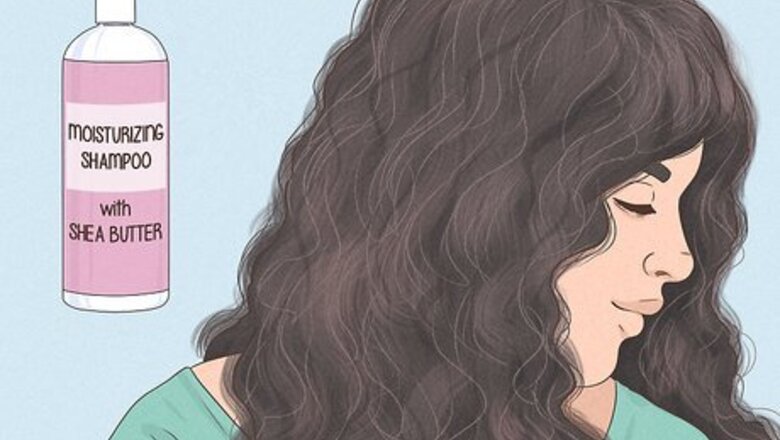
views
Shampoo Selection
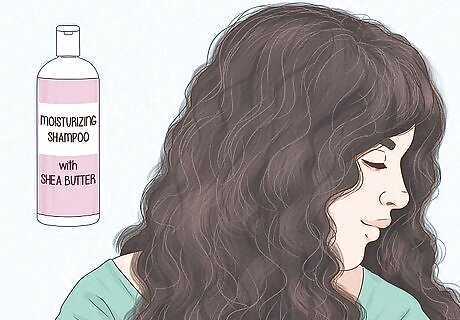
Select a moisturizing shampoo for coarse or kinky hair. If you have coarse or kinky hair, you'll want a shampoo that amps up the moisture in your hair. Shampoos with glycerin, panthenol, or shea butter are good for coarse or kinky hair because they infuse extra moisture into the hair.
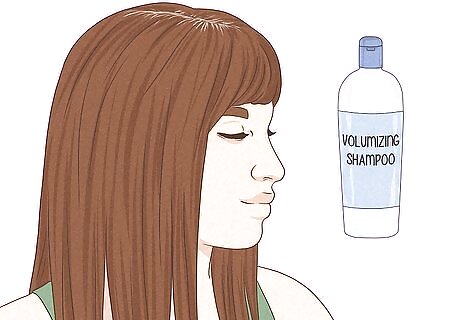
Try a volumizing shampoo for fine and/or thin hair. If you have fine or thin hair, look for a shampoo that adds volume without weighing your hair down. You'll also want to stick to “clear” shampoos – if you can't see through the shampoo bottle, don't get it. Avoid shampoos with ingredients like sodium chloride or polyethylene glycol. Both chemical compounds are used as thickeners, but they can cause hair to become dry and brittle.
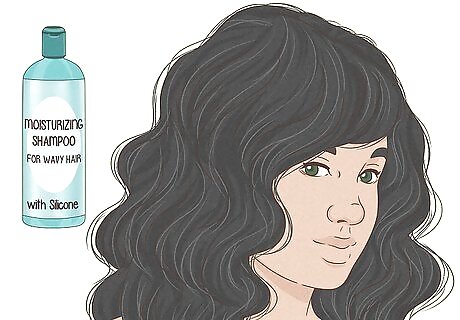
Choose a shampoo with silicone if you have curly or wavy hair. If you have curly or wavy hair, you'll want a moisturizing shampoo, but you should also look for shampoo formulas that include silicone. This gives your curls the moisture they need to stay bouncy but also prevents them from absorbing too much moisture and getting frizzy.
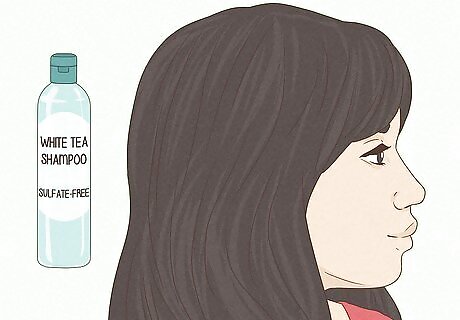
Experiment with a gentle shampoo if you have normal hair. If you have "normal" - otherwise known as medium or well-balanced hair - you can use pretty much any type of shampoo that you like. Just make sure you're choosing shampoos that don't strip your hair - white tea shampoo is a good option. Avoid shampoos with ammonium lauryl sulfate, sodium laureth sulfate, and sodium lauryl sulfate. They are all harsh detergents and will strip your hair of its natural moisture and dry it out.
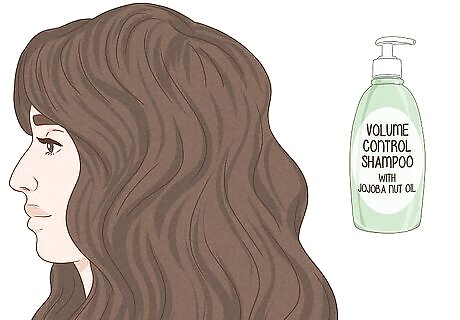
Use a volume-controlling shampoo if your hair is very thick. If you have thick hair, you'll want volume at the roots, but not at the ends, and you'll also want to make sure your hair has enough moisture. Shampoos with shea butter or jojoba nut oil will give your hair volume where necessary and moisturize it at the same time.
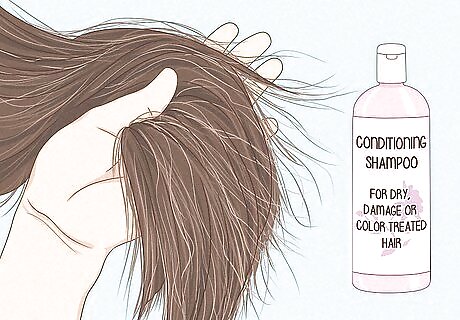
Pick a conditioning shampoo for dry or damaged hair. If your hair is dry, or it's been damaged in any way - from over-coloring, excessive use of heat, or overuse of hair products - look for a shampoo with a conditioning product in it. This includes glycerin, dimethicone, simethicone, polyvinylpyrrolidone, propylene glycol, and stearalkonium chloride. You should also avoid shampoos that have certain alcohols in them, as they can further dry out your hair. Avoid cetearyl alcohol, cetyl alcohol, and stearyl alcohol if you have dry or damaged hair.
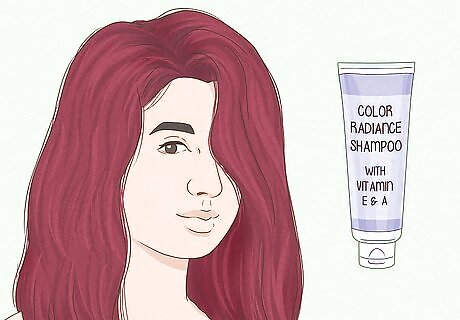
Use vitamin-rich shampoo for colored hair. To maintain the vibrancy of your colored hair, look for shampoo that includes vitamins E and A. Shampoo for color-treated hair is also usually specially formulated and more gentle than regular shampoo.
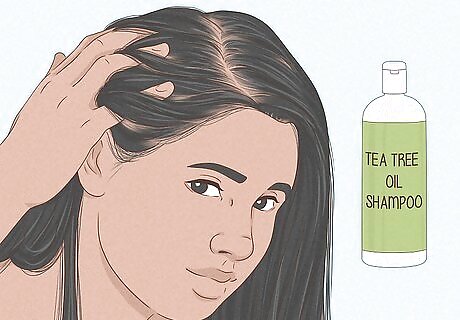
Try shampoo with tea tree oil for oily hair or to cleanse hair. Oily hair is actually the result of your body compensating for a dry scalp by producing more oil. Tea tree oil helps to treat your dry scalp, which in turn stops your body from producing so much oil. Additionally, tea tree oil can deeply clean your hair, so it makes a great cleansing shampoo. EXPERT TIP Bianca Cox Bianca Cox Professional Hair Stylist Bianca Cox is a Hair Stylist, Licensed Cosmetologist, Owner of The Hair Throne, and Co-Owner of Bianchi Salon. Her salons pride themselves on their modernity, individuality, art, and professional services. You can check out The Hair Throne and more of Bianca's hairstyling on Instagram @hairthrone and on her personal Instagram @biancajcox. Bianca Cox Bianca Cox Professional Hair Stylist Consider using a clarifying shampoo every 2-4 weeks for a deep clean. A clarifying shampoo will remove buildup on your hair from minerals and products. However, it's still a good idea to use a sulfate-free clarifying shampoo so you're avoiding any harsh cleansers.
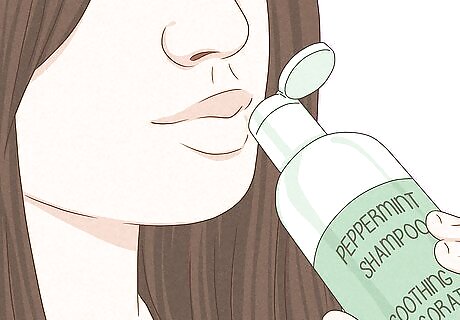
Choose your scent. The easiest part of choosing a shampoo is finding a scent you like. Try to be mindful of your work or school environment while you're choosing, however. Some people have sensitivities to certain scents – if you or someone you work closely with has such a sensitivity, look for a fragrance-free option. Strong scents like peppermint or tea tree oil may linger in your hair longer.
Shampoo Basics
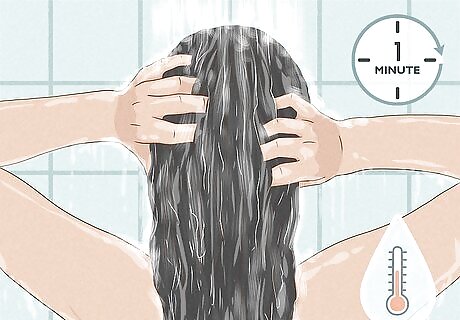
Soak your hair. Before you shampoo your hair, make sure you fully soak it. Soaking your hair in hot water will help open up the cuticles and loosen the oil that's already in your hair. You should rinse for at least a minute; this allows the water to start rinsing gunk out of your hair and makes it more receptive to the nutrients in your shampoo. Although you should soak your hair in hot water, you should turn the temperature down a bit once you're ready to wash your hair. Washing your hair in hot water can cause damage to your hair. It's safe to use hot water on the ends of your hair, but you shouldn't use it on your roots. It could scald your scalp.
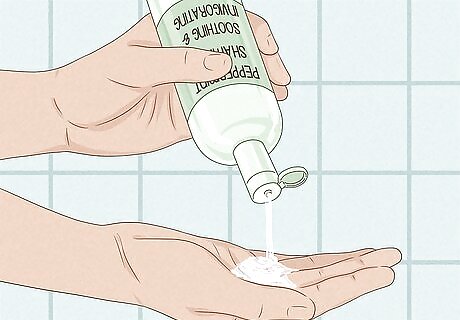
Use the right amount of shampoo. If the amount of shampoo you use is bigger than a quarter, you're using too much. Unless your hair is very thick or very, very long, a quarter-sized amount is enough. If your hair is very thick or long, you can double the amount you use, but you shouldn't use a full handful of shampoo on your head no matter how long or thick your hair is.
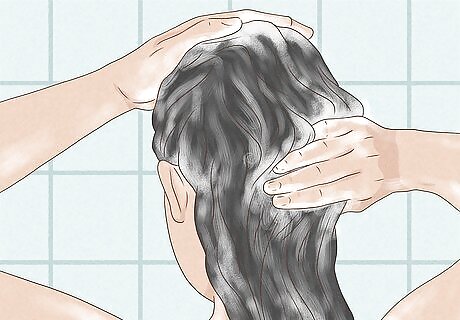
Lather up. When you're shampooing your hair, you should really only lather it at the roots and the nape of your neck and then work it through to the ends. In other words, don't place more shampoo at the end of your hair and work it through from bottom to top. If your hair is longer than past your shoulders, condition your hair first – this keeps the ends of your hair healthy.
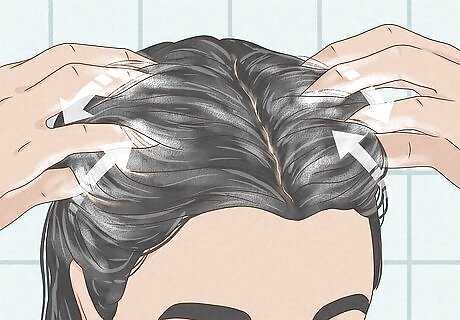
Don't scrub your hair. While you're lathering your hair, be gentle in your movements. Try to avoid circular motions – although these feel like the natural movement for washing your hair – and instead use an up-and-down motion with the tips of your fingers.
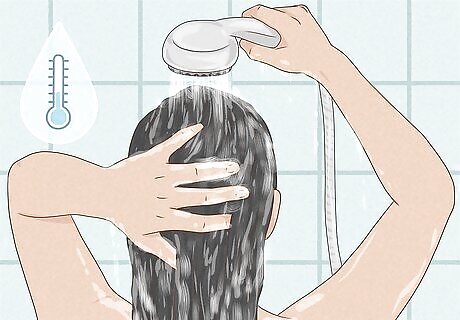
Rinse in cool water. Just like you use hot water when you first rinse your hair to help open the cuticles and prepare your hair for shampoo, you should do your final rinse in lukewarm to cool water. This seals the cuticles and keeps moisture in. It can also make your hair look healthy and shiny.
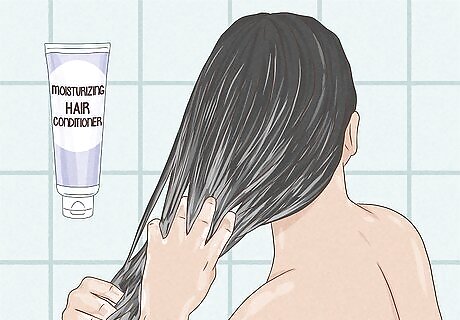
Condition from mid-hair to ends. If you condition your hair after you shampoo it, don't use conditioner on your whole head – this can make it feel weighed down and greasy, especially at the roots. Instead, condition from about the middle of your hair to the ends. Rinse out the condition using cool water, which will seal your cuticle. You should generally condition your hair every time you shampoo. If your hair is damaged from heat or over coloring, you might want to try a deep conditioning treatment once a week in addition to your regular conditioning.
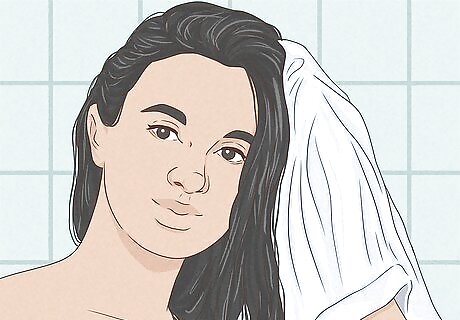
Towel dry your hair. Once you've washed your hair, towel it dry to remove most of the moisture from it and then let it air dry. This is the best way to prevent damage to your hair.
Color-Treated Hair
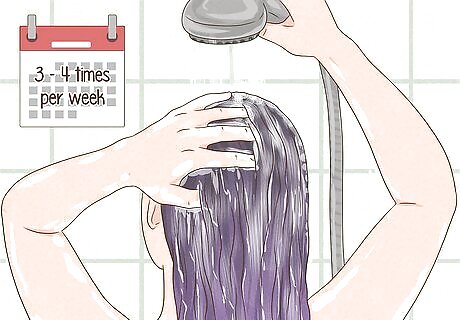
Wash your hair 3 to 4 times per week. Washing your hair makes your color fade faster, and it can also leave your hair feeling dry. Instead of washing every day, try using a dry shampoo on the days between washes so you can extend your color and limit trips to the salon. If you just got your hair colored, wait at least 72 hours before washing it. That way, you won’t accidentally strip out any of the color.
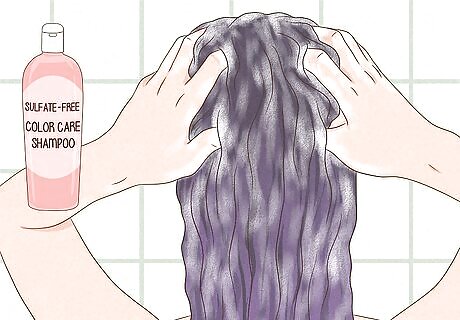
Try a shampoo for colored hair. A lot of normal shampoos are pretty drying and can strip the color out of your hair faster. Go for a bottle of shampoo that says it’s for color-treated hair to keep your locks healthy and make your color last longer. Look for shampoo that’s sulfate-free to avoid drying out your hair.
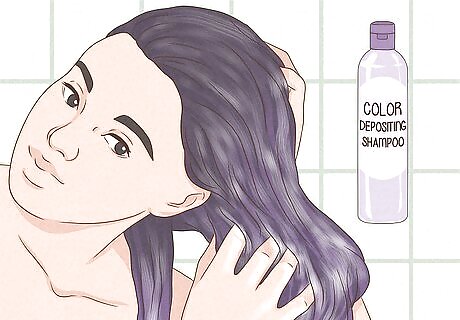
Use a color-depositing shampoo to refresh your color. If your hair is looking a little lackluster but you aren’t quite ready to go to the salon yet, pick up a bottle of color-depositing shampoo from your stylist or at your local beauty supply store. You can use it once or twice a week to give your color a little extra boost and extend your time between salon visits. Color-depositing shampoo is especially good for lighter hair colors that tend to fade faster, like rose gold, orange, or violet. If you have blonde hair, use purple shampoo to minimize brassiness and cut down on yellow tones.
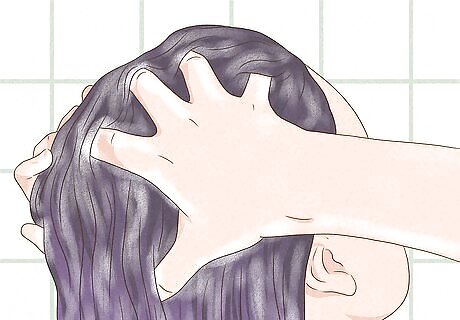
Lather the shampoo at your roots. Squeeze about 1 tsp (4.9 mL) of shampoo into your hand, then bring it up to your wet hair. Gently massage it into your roots with your finger tips, but don’t use your nails to scratch your scalp. Using too much shampoo can strip your hair of color, especially on deeper shades like blue, black, red, and burgundy.
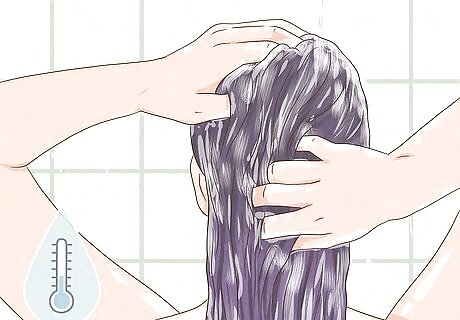
Rinse your hair with cool water. Hot water strips your hair of natural oils as well as color. When it’s time to rinse off, turn the heat down in your shower until it’s no longer steaming. It doesn’t have to be freezing, but it shouldn’t feel hot on your scalp, either. If you want more volume at your roots, rinse your hair upside down.
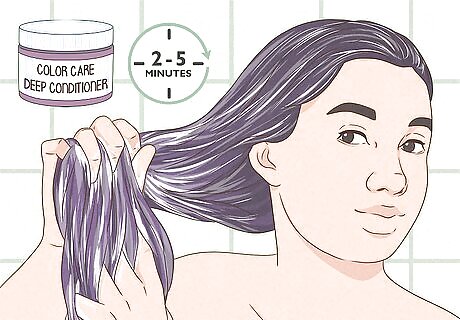
Follow up with a deep conditioner. Dyed hair tends to be drier than virgin hair, especially if you had to bleach it first. Every time you shampoo your hair, use a deep conditioner on the mids and ends to lock in moisture and hydration. Leave it in for 2 to 5 minutes (or whatever is specified on the bottle), then rinse it out with lukewarm or cool water. Look for a conditioner for color-treated hair for intense moisture.
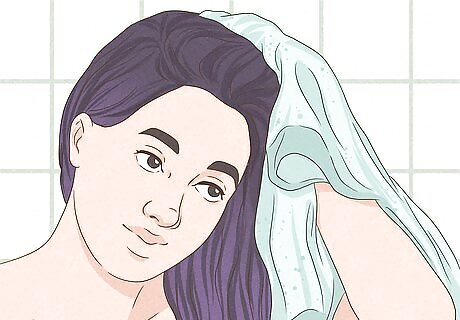
Dry your hair with a towel. Squeeze all the excess moisture out, then let your hair air dry. Hair dryers can cause damage and make your color fade faster, so try to let your hair dry naturally as often as you can. If you want to use a hair dryer, spritz on some heat protectant to keep your hair from getting damaged.
Between Washes
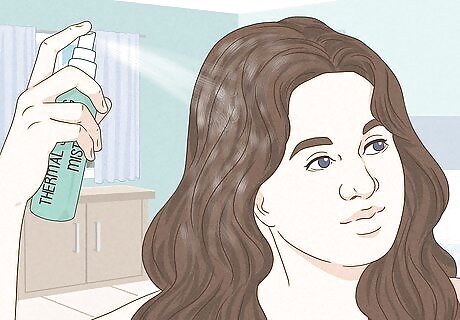
Use protective products if you use heat. If you have to use heat to dry your hair - either because you're looking for a specific style or because you are in a hurry - use protective products on your hair first. This prevents the heat from a blow-dryer or straightener from damaging your hair. Good protective products include thermal setting mist, heat seal spray, or gels designed to control heat and humidity.
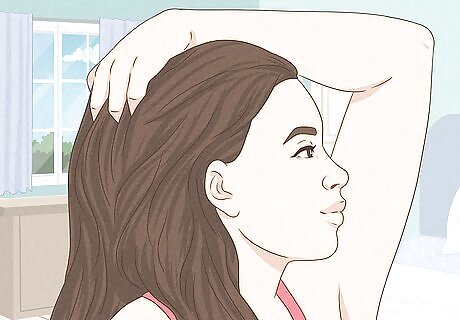
Give your hair a break. How long you can go between washes varies from person to person, depending on your hair type and how comfortable you are with letting your hair get a bit greasy. But you should generally give your hair every other day off from shampooing. If you want to avoid shampooing but want to refresh your hair, rinse with water. This will still remove grime and oil without running the risk of stripping it from over-washing. If you have curly or textured hair, you could use a conditioner in place of a shampoo. This keeps your hair fresh and clean but doesn't strip away the moisture. It's a good method for keeping your natural curls intact and frizz-free.
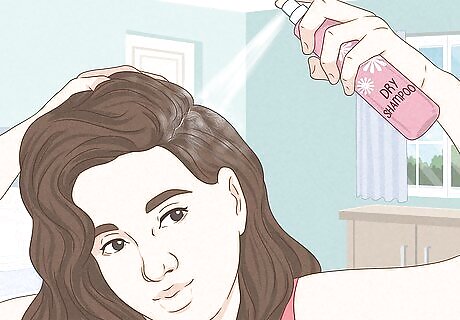
Use dry shampoo. If your hair is looking a little greasy, but you want to put off shampooing it for another day, try dry shampoo. Dry shampoo soaks up the grease and oil in your hair to make it look fresher longer. Start by spraying your hair line around your face (be careful not to spray yourself in the eye). Then divide your hair into 2 to 4 sections, using your index finger to create sections backward and forward from your ear. In each section, divide your hair into 1 to 2 inch (2.5 - 5 cm) sections parallel to your part. Spray your roots in each of these sections. Blend the spray into your hair by using your fingertips to work the spray from your roots to your ends. Otherwise it will look like you have gray/white roots. Then brush out your hair.












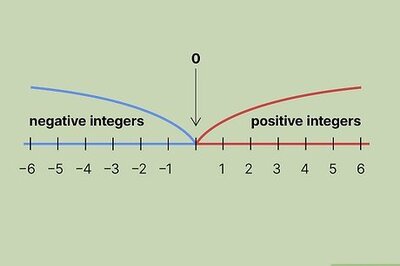





Comments
0 comment